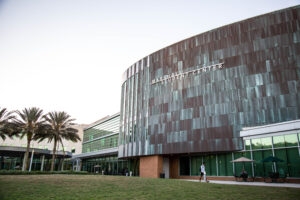OMA Black Heritage Month events aim to highlight intersectionality education

The Office of Multicultural Affairs (OMA) aims to commemorate Black Heritage Month (BHM) with 21 events mixed between online and in person across all three campuses after last year’s events were online due to the pandemic.
OMA aims to provide an educational environment for students, staff, faculty and alumni to educate the USF community on Black culture and celebrate the contributions the Black community has made to society.
Although COVID-19 restrictions are not being enforced by the university, OMA Assistant Director Nicole Luckett said every event will provide resources like masks and hand sanitizers to make students feel comfortable.
“We really try to make sure that we do what we can,” said Luckett. “They make their own choices, but we just want to make sure that we’re being safe, and we’re setting an example.”
Feb. 2 marks the start of the events with the Black Heritage Month Kick-off at the USF Tampa Bull Market starting at 11 a.m. and ending at 2 p.m.
OMA will seek to boost engagement for upcoming events and provide exposure for student associations involved. Students who attend can expect free “swag” such as BHM T-shirts and informational stands from student organizations to become more connected with them, according to Luckett.
In previous years, BHM included events that educated students and staff on the intersectionality of the Black community of USF for those identifying as women and members of the LGTBQ community.
OMA intends to expand its representation this year with the Latin American Student Association, Dominican American Student Association and Club Kreyol co-sponsoring events such as the Feb. 3 Afro-Latinx Conversation from 7-10 p.m. at the Marshall Student Center (MSC) Amphitheater to educate attendees about Black and Latinx origins and influences.
“We are taking those African communities and Latinx communities and influencing or infusing them together to make sure that they are looking at the representations of those two heritages together, which is really cool,” Luckett said.
Luckett said students should keep an eye out for White Scripts and Black Superman: Black Masculinities in Comic Books, a film screening and discussion with documentary filmmaker and anthropologist Jonathan Gayles, hosted by OMA. The screening will take place March 1 from 6:30-9:30 p.m. at the MSC Oval Theater.
Gayles earned his Ph.D. in applied anthropology from USF and won the 2012 Outstanding Documentary Feature from the Popular Culture/American Culture Association for the film.
“We’re going to bring him back to talk about some of the scripts that are written by white people, but featuring Black men as Superman and talking about toxic masculinity,” Luckett said.
Luckett also encouraged students to attend the online Enlightenment Workshop Series held on Microsoft Teams on Feb. 8 from noon to 1 p.m.
The series hosts a panel of educators, including Director of the David C. Anchin Center for the Advancement of Teaching Dana Thompson-Dorsey, English professor Geveryl Robinson and Senior Advisor to the President and Provost for Diversity and Inclusion Elizabeth Hordge-Freeman to discuss perspectives on racial bias and systemic racism.
“It’s really courageous conversations that are designed to foster a culture of inclusive excellence at the University of South Florida,” she said.
“We have different speakers to really talk about different perspectives on bias, cultural competence, systemic racism and those intersecting identities, or trends that we see facing black communities across America and the African diaspora.”
OMA’s efforts this year to partner and coordinate with student organizations that reflect the USF experience has been a highlight, according to Luckett.
“The Office of Multicultural Affairs has been really intentional about programming with student organizations because this is their student experience on campus and we want to be able to support them and do the things that they would like to see,” she said.







